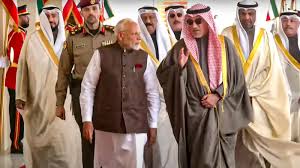India-Kuwait Ties

- 24 Dec 2024
In News:
Prime Minister Narendra Modi's two-day visit to Kuwait marks a significant milestone in India-Kuwait relations, being the first visit by an Indian Prime Minister in over four decades. This visit, undertaken at the invitation of Emir Sheikh Meshal Al-Ahmad Al-Jaber Al-Sabah, aims to strengthen bilateral ties in key areas like trade, defense, energy, and cultural cooperation.
Strategic Partnership and Key Agreements
The visit elevated India-Kuwait relations to a 'Strategic Partnership,' with agreements covering diverse sectors. A Memorandum of Understanding (MoU) on defense cooperation was signed, focusing on joint military exercises, coastal defense, and training. Furthermore, the two countries signed a Cultural Exchange Programme for 2025-2029 and an Executive Programme on Sports Cooperation for 2025-2028, enhancing cultural and people-to-people ties.
The establishment of a Joint Commission on Cooperation (JCC) will monitor bilateral relations, and new Joint Working Groups (JWGs) have been set up in areas like education, trade, and counter-terrorism. Both nations also agreed to deepen collaboration in emerging sectors such as semiconductors, artificial intelligence, e-governance, and technology sharing.
Economic and Energy Cooperation
India and Kuwait share strong economic ties, with bilateral trade reaching USD 10.47 billion in 2023-24. Kuwait is India’s sixth-largest crude oil supplier, meeting 3% of India's energy needs. The countries have also agreed to transition from a buyer-seller relationship in energy to a more comprehensive partnership, with focus areas including oil, gas, refining, and renewable energy. Kuwait’s membership in the International Solar Alliance (ISA) was welcomed by India, reflecting their growing collaboration in the energy sector.
Indian Diaspora and Labour Cooperation
The Indian community, numbering over 1 million, forms the largest expatriate group in Kuwait and plays a pivotal role in the country’s economy. Their contribution spans various sectors, including healthcare, engineering, retail, and business. Kuwait’s Vision 2035, which seeks to diversify its economy beyond oil, presents significant opportunities for collaboration with India, particularly in infrastructure, renewable energy, and technology.
The skilled workforce from India also aligns with Kuwait's developmental goals, offering further opportunities for labor cooperation, especially in sectors like healthcare, technology, and infrastructure.
Geopolitical and Multilateral Cooperation
India-Kuwait relations hold regional significance, particularly in West Asia. Kuwait's role in the Gulf Cooperation Council (GCC) amplifies its geopolitical importance. India’s engagement with Kuwait helps maintain a balanced presence in the region, essential for its energy security and broader geopolitical interests. The GCC, which includes six Arab states, remains a key partner for India, contributing to significant trade and remittances. India also seeks to conclude a Free Trade Agreement with the GCC to enhance economic collaboration.
Cultural and Historical Ties
India and Kuwait’s relationship has deep historical roots, dating back to the pre-oil era when maritime trade was a cornerstone of Kuwait’s economy. Over the years, this relationship has grown, with India being a major trading partner and Kuwait contributing significantly to India's energy needs. The Indian Rupee was once the legal tender in Kuwait, underscoring the strength of their historical ties.
In conclusion, PM Modi's visit to Kuwait sets the stage for enhanced cooperation across several domains, reinforcing the strategic partnership between the two nations. It also highlights India's broader objectives in the West Asia region, balancing economic, geopolitical, and cultural interests.
